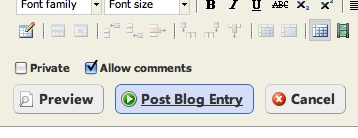Friday, May 29, 2009
Wednesday, May 27, 2009
Synchronizing your PC's clock daily
One of the poorest parts of a PC is its ability to keep accurate time. I could never figure out why, but a PC's clock is worse at keeping time than a gumball machine plastic watch.
Windows does have a feature that tries to synchronize the clock with a server on the Internet, but it does not synchronize often enough, in my view. And if it fails when it attempts to synchronize, your PC's clock can get way out of wack.
For some reason, Windows makes it impossible to control how often the clock gets synchronized. Probably to avoid a massive traffic problem on the time server.
But today I found a nifty little program that lets you change the synchronizing to occur either daily or hourly.
I think hourly may be a bit overkill, but daily is definitely a good idea.
Here's a link to the utility: http://www.dougknox.com/xp/utils/xp_inet_time.htm
It comes in a simple zip file, and there is no installation necessary. The zip file contains one file. Just copy that file to wherever on your hard disk you'd like to keep it, and then run the program.
It displays a little dialog box asking how often you'd like to synchronize the clock. You click the option, click Apply, and the click Exit. That's all there is to it!
Works with Windows XP and Vista. I haven't tested Windows 7 yet, but it probably works there too.
Monday, May 25, 2009
New version of Google Chrome released
Google has released a new version of their Chrome Web browser.
If you have never used Chrome, I would definitely recommend giving it a try. It is super-fast, and will make everything you do on the web much faster than whatever you're using now.
Incredibly, the new version (which is 2.x) manages to get even faster, both with the screen rendering times and with how fast it can execute scripts.
If you already have Chrome installed, you can see if it's the latest version by clicking the Wrench button in the upper-right corner, and then selecting About Google Chrome from the menu. The version number appears at the bottom of the about box, and if it's an older version, you just click on the Update button and it installs the latest version for you.
If you don't have Chrome installed, go to www.google.com/chrome and click Download Google Chrome. (Grr, I wish these non-IE Web browsers would automatically make links clickable like IE does -- my biggest pet peeve with them!)
Don't ever be afraid to install multiple Web browsers on your computer. It does not do any harm, and it in fact gives you an opportunity to try out different ways to browse the web.
The fact that all Web browsers are free does hurt either.
If you're a computer newbie/non-techie, just go ahead and try it anyway. It's about as easy to do as anything you've done on the web.
BTW, one nice thing about Chrome is that like Safari and Firefox, it can do rounded corners, so you get to see the Lottery Post buttons in their best/intended form, like this:

Monday, May 4, 2009
Planning on buying a new PC? Read this important info!
When you buy a PC, the one thing you always try to do is to buy something that will last for several years and won't be quickly outdated. The last thing anyone wants is to buy a new PC, only to find that it is useless in a couple years.
With that in mind, I read an article today about picking the the type of CPU (Central Processing Unit, or microprocessor) in your new PC to be sure it is future-proof. (Some people refer to the CPU as the computer's "brain", but I personally hate that analogy.)
Microsoft is currently putting the finishing touches on it's latest operating system, called Windows 7. It is the successor to Windows Vista, and I think you'll find that unlike Vista, Windows 7 is going to have a very good reception.
I have personally been running Windows 7 on test machines for many months now, and I now have the Release Candidate running. It is one solid operating system. There are so many nice touches in there.
One of the nice touches that will be available in some versions of Windows 7 is Windows XP Mode. I know this is going to be a very popular feature.
Windows XP Mode lets you run Windows XP applications right alongside new Windows 7 applications. They even look like Windows XP programs, with the all-too-familiar blue window frame design that Windows XP uses. You'll even get a Windows XP task bar at the bottom of the screen. (This is, if you want it.)
But, here's the catch. (And the reason for linking to the important article about CPUs in new computers.)
If you want to run Windows XP mode, your CPU must have a certain technology built-in, and when you buy a new PC it can be extremely difficult to tell if the CPU has it.
The technology is called "virtualization". It is available in both Intel and AMD CPUs, but you need to be careful which model you're buying to be sure it has it. In some cases, it seems there is little rhyme or reason as to why it is included or not included with a particular CPU.
The bottom line is that if you are buying a new PC, absolutely, positively, be sure it has virtualization built-in to the CPU. The last thing you want is to find out that your new computer can't handle a very desirable feature a year or two down the road.
The article includes a full listing of all the current CPUs available, and points out which ones have virtualization.
Also, apart from the article, Windows 7 is almost certainly going to be officially released somewhere between August and October of this year. If you're looking to buy a new PC this summer (or thereabouts), you may want to wait until the PC makers start coming out with their free Windows 7 upgrade offers, which tend to start about a month or so before the release of the new OS.
That's what they do every time a new Microsoft operating system is going to be released shortly. It allows you to buy the buy with the assurance that when the new operating system is released, they will ship you the installation CD for free.
Here's the article about CPUs, and their support for virtualization. Highly recommended reading!
http://blogs.zdnet.com/Bott/?p=946
Update:
Here's another very useful article, and is complementary to the other article linked above. Microsoft has come out with their official minimum recommendations for Windows 7, which is great information to have at your disposal when shopping for a new PC.
By no means do I ever recommend getting the minimum specification. But it does give you a good heads-up about how well your PC should perform, relative to the lowest PC running Windows 7.
